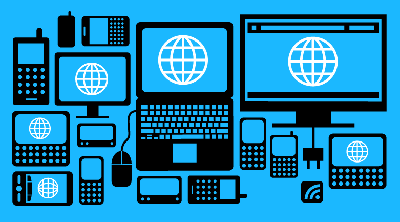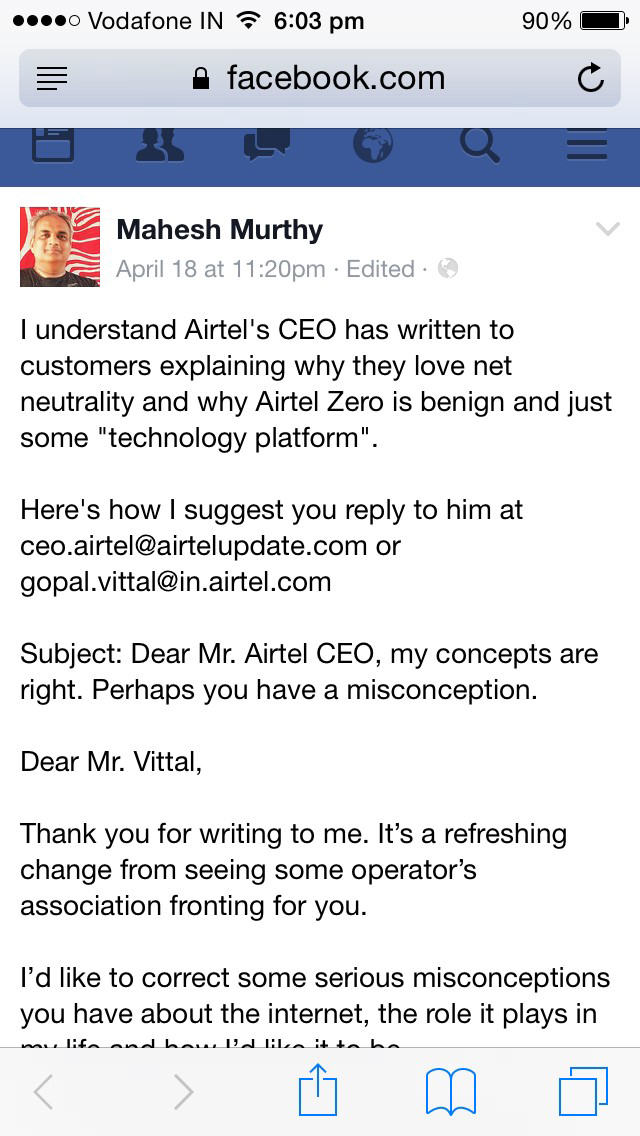Has Airtel lost the PR battle over net neutrality?
PR Insight
Paarul Chand
 The last one month has seen an unprecedented consumer campaign for net neutrality. This campaign has important PR lessons for companies pointing to the clear rise of the ‘Internet Consumer’, a powerful, vocal group in India that does not hesitate to turn activist.
The last one month has seen an unprecedented consumer campaign for net neutrality. This campaign has important PR lessons for companies pointing to the clear rise of the ‘Internet Consumer’, a powerful, vocal group in India that does not hesitate to turn activist.
Airtel is the first major brand to be affected by this trend, a reaction to its' Airtel Zero platform launched on April 6th, 2015. Airtel says its' aim is to provide free access to Apps paid for by their developers. Just ahead of this announcement, TRAI –India’s apex telecom body put out a policy paper on net neutrality and asked for public comments on the issue of net neutrality.
The two events proved to be a perfect storm of bad timing, making Airtel a very visible target, inspite of Facebook’s similar programme with Internet.org. Within days a group of activists that included influential voices such as Pinstorm's Mahesh Murthy, comedy collective AIB, celebs, activists and entrepreneurs’ all took up the issue, prepared answers for consumers to send to TRAI and came up with a powerfully simple call to action –“ Save the Internet.” Flipkart, one of the most high profile names on Airtel Zero bowed to public pressure and pulled out.

On the other hand, Airtel says its’ platform will provide cheap marketing and access to millions of customers for companies that sign up with Airtel Zero and pay Airtel for pushing the apps to its customers. In a press release Airtel said that, “The results of our pilot program indicate that ‘Airtel Zero’ can deliver the same results as traditional digital marketing channels at 1/3rd the cost.”
Vipul Bondal, Founder & CEO, Veriitte Consulting however says that, “In my view, Airtel has lost the perception battle. Globally, corporations are projected by activists as greedy profit-mongers, who are out to bankrupt people and governments. Unfortunately, the Airtel Zero and internet.org projects have become victims of this kind of thinking. Plus, the overhang of malpractices by telecoms during the 2-G scam, deepened suspicions, and made it a heady cocktail. It is a ripe situation for any activist to exploit. Most netizens (including me, initially) were convinced that this is some grand exercise by the Government – hand in glove with telecom operators and the regulator - to curb Internet freedom and neutrality. Poor communication by the regulator, Cellular Operators Association of India (COAI) and the telecom operators in giving the facts of the matter deepened the suspicion.”
Telecom operators need better PR
Over a million consumer emails were sent to TRAI for net neutrality and the debate rages on. Even though Facebook has gone ahead with its Internet.org programme this week-similar to Airtel Zero, Airtel is the company that has taken most of the flak. The general perception is that it’s anti-consumer, a charge, which the entire telecom sector faces.
N Chandramouli, CEO, Blue Lotus says that, “To address the concerns that have been raised about Airtel Zero, the telecom industry has to change its personality. From ‘free’ they have to start thinking ‘freedom’. Just this one fundamental shift will make the telecom industry champions of the consumers rather than duel with them from the opposite side. No brand can survive in an environment when the consumers hate it. And so, the telecom companies have a phenomenal opportunity to make this choice - after all they own the pipe through which all the perceived ‘freedom’ of the Internet comes from.”
|
- TRAI published consultation paper on net neutrality on 27th March, 2015 - Airtel announces Airtel Zero on 6th April 2015 - Mahesh Murthy writes against Airtel and Vodafone on April 7th, 2015 -AIB publishes video ‘Save the Internet’ on 11th April, 2015() - #SavetheInternet call for action becomes a strong rallying point - Flipkart pulls out of Airtel Zero on 14th April, 2015 -Cleartrip, NDTV pulls out of FB backed Internet.org on April 15th, 2015 - By 24th April, 3 million emails supporting net neutrality reach TRAI - Facebook launches Internet.org on 5th May 2015, says its now ‘open ‘to all websites with some riders -DoT secretary on 6th May, 2015 says Internet.org, Airtel Zero violates net neutrality |
Owning the business pipe is one of the main arguments put forward by the telecom sector, they have also coined the term ‘net equality’ in an attempt to travel the debate away from an absolute deifintion of ‘net neutrality’. PRmoment India reached out to Vodafone India and Airtel for comments. Airtel shared its press statements on the issue and Vodafone shared the press release send out by the Cellular Operators Association of India (COAI), the latter saying that they remained committed to the larger industry view on the subject. What is this larger industry view? As per the press release by COAI, “ The operators have invested billions of dollars in license fees, spectrum fees and network roll-outs. Yet, the Industry still makes negative return on the capital employed.”
The release goes on to say that, “The industry estimates the country would need an additional capital outlay of INR 300,000 to 500,000 crores over the next 10 years to meet the PM’s vision of Digital India, and connect 1 billion Indians to the exciting world of Internet. The need of the hour, therefore, is to have a sustainable industry that has the ability to invest in growth of data services and connectivity to all.”
From their perspective this is a strong business argument, however it's an arguement that doesnt connect with customers. Limited apps choice or the risk of slow speeds on other apps is on the other hand, strikes a huge chord.
Chandramouli ask that “Is it not strange that a brand which has millions of customers also faces some credibility issues here and there. Credibility and trust are dynamic, which keep changing and settle at new levels depending on the current circumstances. The activism in the case of Airtel Zero is not by an activist group but by people in general. You and me are a part of this movement. Rather than activist consumers, I will say it is a movement of the people – an ‘Internet Spring’, if you will. The success of the movement is also a reflection of the power of the Internet, and also the very reason that choice with regard to what we use, see, read and do using the net, must always be in the hands of the consumer.”
Airtel’s response
Seeing the level of mass action, Airtel was forced to address the issue. An email was sent out to employees and customers by Gopal Vittal’s (MD & CEO, Bharti Airtel – India & South Asia) , saying that, “There has been a deliberate effort by some quarters to confuse people that we will offer differential speeds or differential access for different sites. This is untrue. After all we earn revenues from data. If there are more customers who are on the Internet the better it is for our business. Our revenues are not dependent on which sites they visit because we charge on the basis of consumption of mega bytes not which site they visited. “
Vittal’s letter also compared the programme to that of a toll free call, where companies pay for calls customers make to its toll free numbers.
This letter was promptly challenged. Internet influencer and one of the architects of the pro net neutrality campaign, Mahesh Murthy, posted a sample letter that can be sent in response to Vittal by Airtel consumers. It said, “You’ve probably seen that over 800,000 email have gone from concerned users like me to the Government to ask them to ensure net neutrality and to ban all kinds of zero-rating plans. That should give you an idea of the number of people who have a clear concept about what exactly they expect from licensed internet providers in India. I have no opposition to only your plan, it’s nothing personal – I also oppose all other zero-rating plans including what Facebook is pushing via something called Internet Dot Org on the Reliance network. If you stop this Airtel Zero plan on my network and never bring back anything like it ever again, and I’ll be your fan again.”
Should Airtel apologize and withdraw Airtel Zero?
Given the environment, the question is whether Airtel should continue with the project?
Chandramouli says that, “Withdrawal of Airtel Zero is a matter of business policy and therefore depends on how Airtel looks at its future. One withdraws when something is faulty, wrong, harmful or dysfunctional. To withdraw, Airtel has to first believe some of the aforesaid about Airtel Zero. I may be not be too wrong in this surmise and I think the internal debate in Airtel is less on taking a fresh approach, but more in terms of finding a ‘solution’ to their self-created problem. I am sure an apology has crossed their mind. But the apology is not just a statement to make; it is a philosophical shift to the opposite side from what Airtel proposed earlier.”
Bondal also offers a nuanced opinion, saying that, “There’s no need for Airtel to apologize, in my view, because whatever the company has done is within the framework of the law. They need to communicate better though, next time around."
In the battle of perception, consumers care little for official policy and more about their benefits. And for that Airtel and other telecom operators will need to do more than written statements to the media and engage strongly to develop consumer trust.
If you enjoyed this article, you can subscribe for free to our weekly event and subscriber alerts.
Featured

PR professionals share their views on journalists publicly calling them out on story pitches

Auto blogger renders unconditional apology to Value 360 for defamatory posts

Hottest Indian startups of 2020, Paytm, Dreams 11 lead the charge: Wizikey Report




